Reuters
Wed, January 24, 2024
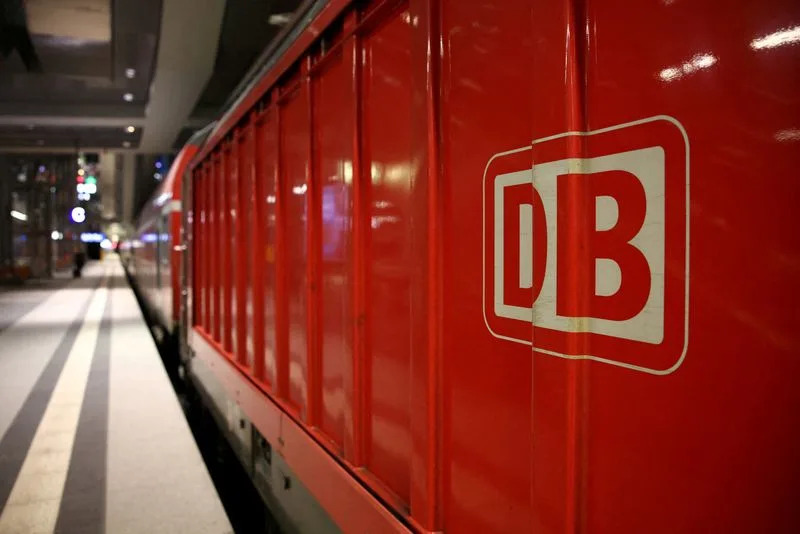
German train drivers union calls for longest strike in Deutsche Bahn's history
BERLIN (Reuters) - German train drivers walked off the job again on Wednesday in what is set to be Germany's longest-ever rail strike, spelling more headaches for commuters with scant signs of a return to the negotiating table on the horizon.
The strike, which began at 2 am (0100 GMT) on Wednesday and is set to last until Monday evening, is the fourth round of industrial action in the GDL union's dispute with state-owned Deutsche Bahn and comes just two weeks after a previous strike ground national rail traffic to a near halt for three days.
A spokesperson for the national rail operator spoke of renewed "massive restrictions" across the country.
"We believe you have to come to the table, you have to find compromises. That is the only way," the spokesperson told reporters, pointing to the six-day strike's "massive impact on the economy".
Drivers in rail freight are holding a simultaneous strike.
GDL leader Claus Weselsky told broadcaster ARD that he was ready to compromise in the dispute over pay and working hours, but said Deutsche Bahn's offers didn't go far enough.
"We have to strike longer and harder because the railway management is resistant to advice," he said.
(Reporting by Rachel More)
German railway Deutsche Bahn prepares for six-day drivers' strike
DPA
Tue, January 23, 2024
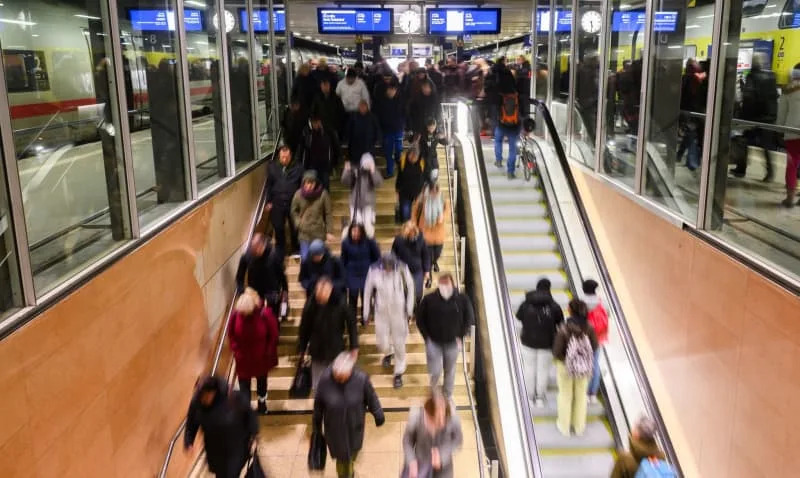
Passengers walk through Hanover Central Station (picture with long shutter speed). The German Train Drivers' Union (GDL) has called for another strike at Deutsche Bahn lasting several days. Julian Stratenschulte/dpa
German national railway Deutsche Bahn and millions of passengers across the country are bracing for the start of a six-day strike by the train drivers' union GDL.
The strike is scheduled to begin in the early hours of Wednesday morning and is expected to cause massive disruptions to train service throughout the country.
Deutsche Bahn on Tuesday began publishing very limited emergency timetables of trains that will still run despite the strike by the GDL trade union.
The strike on passenger rail is expected to last until Monday. In freight service, the strike will begin hours earlier on Tuesday evening.
During previous strikes, about 80% of all long-distance trains were cancelled. Deutsche Bahn is also expecting considerable cancellations and delay in regional train service over the next few days, although the extent of these will vary from region to region.
Deutsche Bahn-operated urban commuter rail lines, branded as "S-Bahn" in Germany, will also be affected by the strike. The work stoppage also affects regional trains, though the rail operator said some areas may be more affected than others.
Deutsche Bahn and the GDL trade union have been locked in bitter collective bargaining talks for months, with the union demanding that the railway cut standard working hours in addition to offering raises.
The strike is the fourth by the union in recent months, but is expected to be the longest by far.
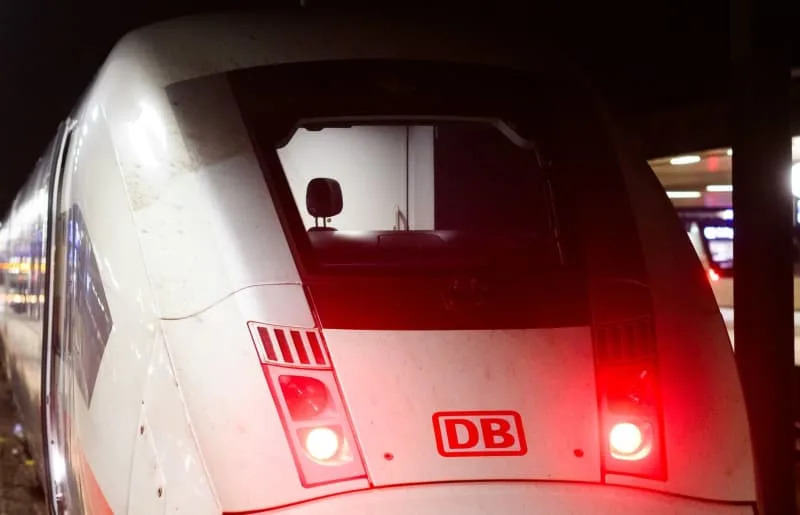
A Deutsche Bahn ICE train with an abandoned driver's seat at Hanover main station. The German Train Drivers' Union (GDL) has called for another strike at Deutsche Bahn lasting several days. Julian Stratenschulte/dpa
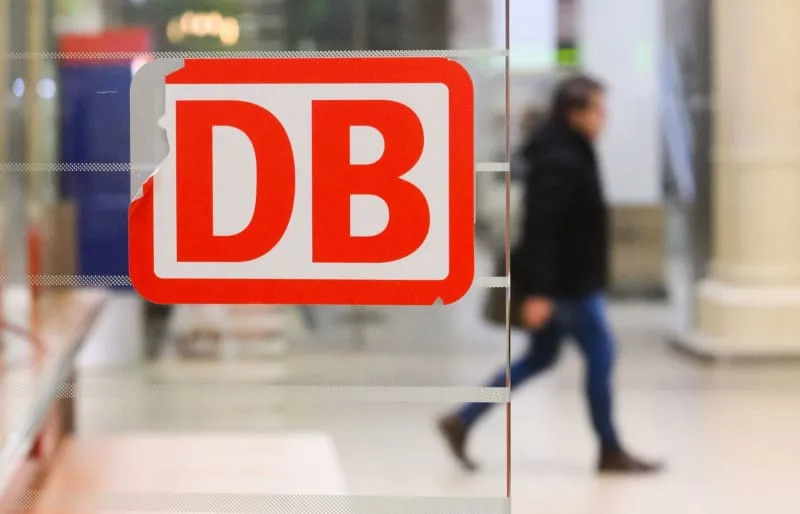
A scratched Deutsche Bahn DB logo is stuck up at Hanover Central Station. The German Train Drivers' Union (GDL) has called for another strike at Deutsche Bahn lasting several days. Julian Stratenschulte/dpa
Germany train strikes: DB drivers announce a week-long walkout starting on Wednesday
Ruth Wright
Mon, January 22, 2024

Germany train strikes: DB drivers announce a week-long walkout starting on Wednesday
Train drivers in Germany have announced an almost week-long strike starting on Wednesday.
It is the latest in a series of walkouts over working hours, conditions and pay. Union GDL said it has rejected a pay offer made on Friday by German rail operator Deutsche Bahn (DB).
"With the third and supposedly improved offer, Deutsche Bahn has once again shown that it is undeterred in pursuing its previous course of refusal and confrontation - there is no trace of any desire to reach agreement," the union said in a press release on early Monday morning.
Earlier this month, rail travel was brought to a 'near standstill' in Germany when GDL union members went on strike.
The upcoming passenger train strike will begin at 2am on 24 January and last until 6am on Monday 29 January.
Why are Germany's rail workers striking?
The GDL union voted overwhelmingly to authorise 'fully-fledged' strikes at state-owned DB.
The group staged a 24-hour 'warning strike' on 8 December, a common tactic in German wage negotiations, but the disagreement continues to escalate.
Following a three-day walkout earlier this month, the upcoming strike will be the longest to date in the ongoing row.
The central issue is the union’s call for shift workers’ hours to be reduced from 38 to 35 hours per week without a pay reduction, a demand at which employers so far have baulked.
GDL is seeking a raise of €555 per month for employees plus a one-time payment of up to €3,000 to counter inflation. DB said earlier this month that it made an offer that amounts to an 11 per cent raise.
It has also said shift workers can move from a 38 to a 37 hour week from 2026, or receive extra pay if they want to remain on their current hours.
Will there be more train strikes in Germany in 2024?
Unfortunately for travellers, it's likely there will be further strikes this year as negotiations continue.
“What is coming now will be more powerful, longer and harder for customers” than the walkouts so far, GDL's chairman said earlier this month - a threat that is now coming to fruition.
How will Germany's rail strikes affect passengers?
During the last strike in early January, Deutsche Bahn said only around 20 per cent of its long-distance trains were running, including many regional and commuter trains in cities like Berlin.
DB said that longer trains would be used for the available journeys to accommodate as many people as possible. However, it said services were not guaranteed and asked passengers to avoid non-essential travel during the strike.
During the 'warning strikes' earlier in December, long-distance, regional and S-Bahn services were subject to delays and cancellations. Other railway companies such as the Transdev Group (including Bayerische Oberlandbahn and NordWestBahn) were also affected.
As Germany's largest employer of train drivers, DB manages not only long-distance passenger trains such as ICE, IC, EC, and Nightjet trains, but also regional trains and S-Bahn lines.
The strike will be nationwide and impacts are expected to be felt across the country.
"The renewed strike will once again have a massive impact on all German rail operations," DB says in a statement about the upcoming strike.
The rail operator says it will run an emergency timetable with a "greatly reduced" range of journeys for long-distance, regional and S-Bahn services. It recommends that passengers check their journey 24 hours in advance and make seat reservations on long-distance services.
If you have a train ticket booked during this time, you can use it for travel on 23 January - ahead of the strike - or at a later date. If your train is cancelled, you will be entitled to a full refund. Read on for your rights as a passenger.
Where you can find information on train timetables
Customers can find up-to-date information about their train route via the DB Navigator app or the Deutsche Bahn website. It's worth double checking these before leaving home, as additional trains may be cancelled last-minute during the strike.
You can call DB's special travel information hotline on +49 (0)8000-996-633.
Is a flight really quicker than a train? I put it to the test from London to Lyon
Refunds: What are train passenger's rights in Germany?
If your journey is affected, you have various options, according to the Deutsche Bahn website:
Fears over economy grow as German rail begins longest strike
Mon, January 22, 2024

Germany train strikes: DB drivers announce a week-long walkout starting on Wednesday
Train drivers in Germany have announced an almost week-long strike starting on Wednesday.
It is the latest in a series of walkouts over working hours, conditions and pay. Union GDL said it has rejected a pay offer made on Friday by German rail operator Deutsche Bahn (DB).
"With the third and supposedly improved offer, Deutsche Bahn has once again shown that it is undeterred in pursuing its previous course of refusal and confrontation - there is no trace of any desire to reach agreement," the union said in a press release on early Monday morning.
Earlier this month, rail travel was brought to a 'near standstill' in Germany when GDL union members went on strike.
The upcoming passenger train strike will begin at 2am on 24 January and last until 6am on Monday 29 January.
Why are Germany's rail workers striking?
The GDL union voted overwhelmingly to authorise 'fully-fledged' strikes at state-owned DB.
The group staged a 24-hour 'warning strike' on 8 December, a common tactic in German wage negotiations, but the disagreement continues to escalate.
Following a three-day walkout earlier this month, the upcoming strike will be the longest to date in the ongoing row.
The central issue is the union’s call for shift workers’ hours to be reduced from 38 to 35 hours per week without a pay reduction, a demand at which employers so far have baulked.
GDL is seeking a raise of €555 per month for employees plus a one-time payment of up to €3,000 to counter inflation. DB said earlier this month that it made an offer that amounts to an 11 per cent raise.
It has also said shift workers can move from a 38 to a 37 hour week from 2026, or receive extra pay if they want to remain on their current hours.
Will there be more train strikes in Germany in 2024?
Unfortunately for travellers, it's likely there will be further strikes this year as negotiations continue.
“What is coming now will be more powerful, longer and harder for customers” than the walkouts so far, GDL's chairman said earlier this month - a threat that is now coming to fruition.
How will Germany's rail strikes affect passengers?
During the last strike in early January, Deutsche Bahn said only around 20 per cent of its long-distance trains were running, including many regional and commuter trains in cities like Berlin.
DB said that longer trains would be used for the available journeys to accommodate as many people as possible. However, it said services were not guaranteed and asked passengers to avoid non-essential travel during the strike.
During the 'warning strikes' earlier in December, long-distance, regional and S-Bahn services were subject to delays and cancellations. Other railway companies such as the Transdev Group (including Bayerische Oberlandbahn and NordWestBahn) were also affected.
As Germany's largest employer of train drivers, DB manages not only long-distance passenger trains such as ICE, IC, EC, and Nightjet trains, but also regional trains and S-Bahn lines.
The strike will be nationwide and impacts are expected to be felt across the country.
"The renewed strike will once again have a massive impact on all German rail operations," DB says in a statement about the upcoming strike.
The rail operator says it will run an emergency timetable with a "greatly reduced" range of journeys for long-distance, regional and S-Bahn services. It recommends that passengers check their journey 24 hours in advance and make seat reservations on long-distance services.
If you have a train ticket booked during this time, you can use it for travel on 23 January - ahead of the strike - or at a later date. If your train is cancelled, you will be entitled to a full refund. Read on for your rights as a passenger.
Where you can find information on train timetables
Customers can find up-to-date information about their train route via the DB Navigator app or the Deutsche Bahn website. It's worth double checking these before leaving home, as additional trains may be cancelled last-minute during the strike.
You can call DB's special travel information hotline on +49 (0)8000-996-633.
Is a flight really quicker than a train? I put it to the test from London to Lyon
Refunds: What are train passenger's rights in Germany?
If your journey is affected, you have various options, according to the Deutsche Bahn website:
Fears over economy grow as German rail begins longest strike
AFP
Tue, January 23, 2024
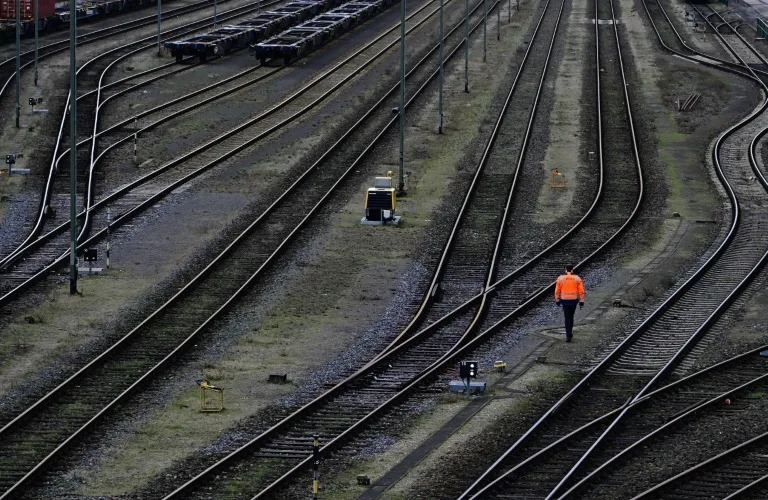
Rail traffic comes to a standstill as German train drivers strike again (Tobias SCHWARZ)
German train drivers began on Wednesday their longest-ever strike, piling on travel misery for thousands of passengers in an escalating industrial dispute that economic experts warn could cost the economy up to a billion euros ($1.1 billion).
Transport Minister Volker Wissing has slammed as "destructive" the six-day industrial action that heaps further pressure on supply chains that are already facing disruption because of attacks by Yemen's Huthi rebels on shipping via the Red Sea.
The prolonged action "is a strike against the German economy," said Deutsche Bahn spokeswoman Anja Broeker, noting that cargo traffic handled by the service include supplies for power plants, refineries".
"DB Cargo will do everything to secure the supply chain, but it's clear that there will be some impact," she added.
The walkout called by the GDL union runs from 2:00 am (0100 GMT) Wednesday through to 1700 GMT on Monday for passenger traffic while the strike for freight trains began earlier on Tuesday.
Not only long-distance trains but also suburban services, some of which like Berlin's are operated by Deutsche Bahn, are affected, just over a week after the last round of walkouts between January 10 and 12.
The fourth strike since November left passengers scrambling to rebook or cancel their plans, and sparked warnings of huge costs to the state and industry at a time when the German economy was already ailing.
Deutsche Bahn estimated each strike day to cost "a low two-digit million figure", but industry experts warned the impact on the economy would be far bigger.
- 'Unreasonable' -
Michael Groemling of Cologne's Institute for Economic Research said nationwide train stoppages can cost up to 100 million euros a day to the economy, but warned that the impact "may not rise linearly in a strike that lasts several days, but partially multiplies".
Given the disruptions with sea freight over the Huthi attacks, as well as issues on road transport, "rough estimates suggest that in extreme cases, this strike can cost up to a billion euros", he said.
Wissing slammed the GDL union for refusing to negotiate during the walkout.
"I find that it is unreasonable vis-a-vis train travellers that the trains are standing there blocked, while one's not at the same time sitting at the negotiations table," said the transport minister.
But the union said it had rejected the Deutsche Bahn's "third and allegedly improved offer" because bosses had shown "no sign of a willingness to reach an agreement.
The GDL is seeking higher salaries to compensate for inflation, as well as a reduced working week from 38 to 35 hours with no loss in wages, arguing that it needed to make train driver jobs "more attractive" to young people.
But Deutsche Bahn blasted the latest round of industrial action, saying it had offered pay rises of up to 13 percent and a one-off inflation bonus, as well as the chance to reduce the working week by one hour from 2026.
Deutsche Bahn last year also clashed with the EVG rail union, which represents around 180,000 non-driver rail personnel, reaching an agreement in late August.
The latest walkout breaks the previous record of a May 2015 action, also called by GDL, that lasted around five days.
bur-hmn/mfp/rl
No comments:
Post a Comment